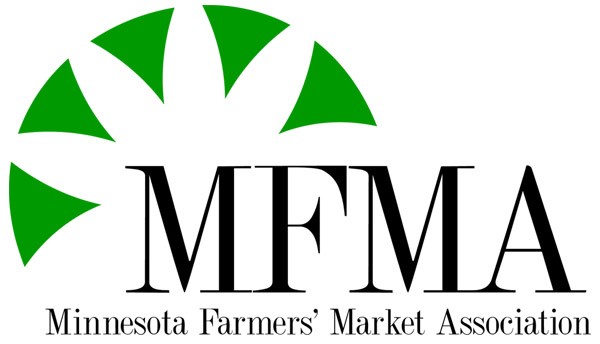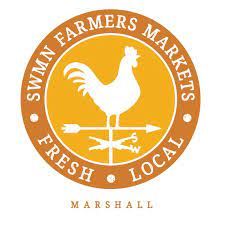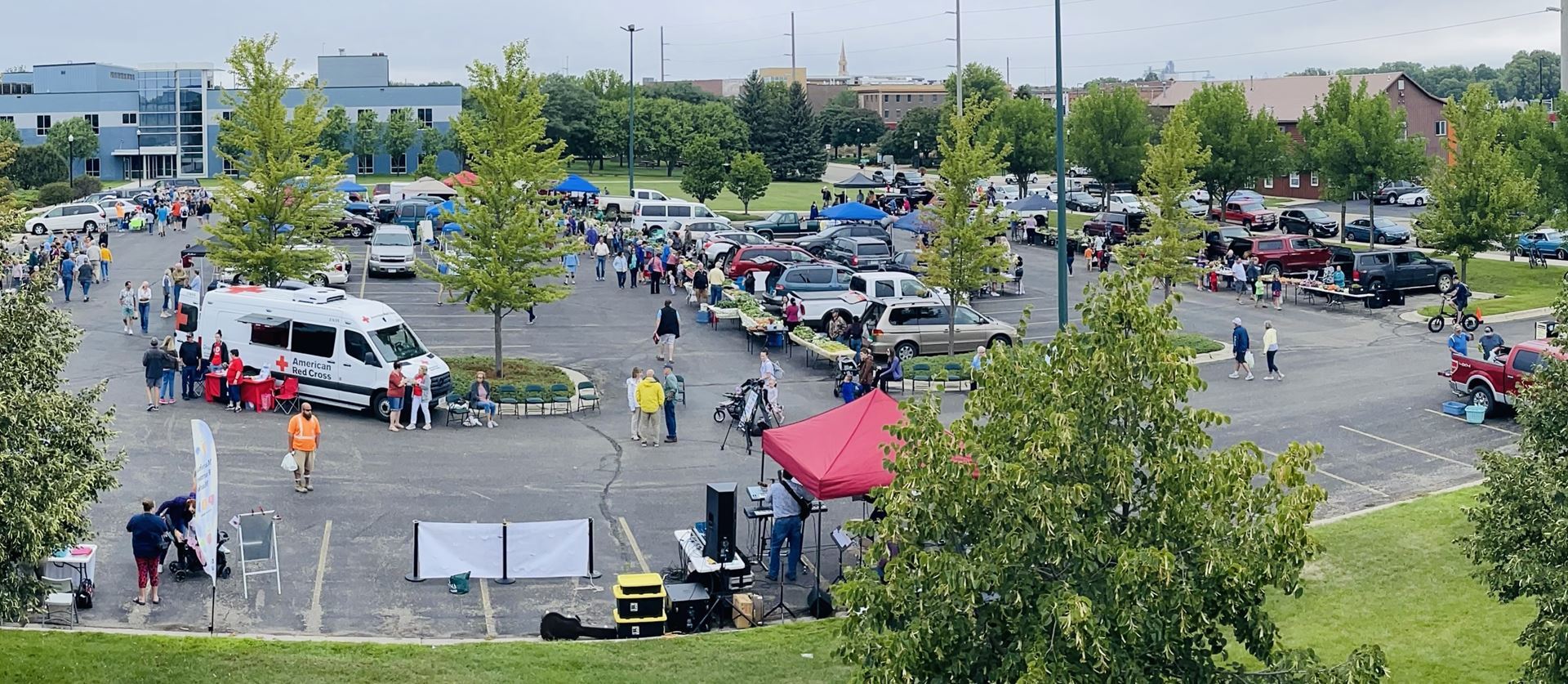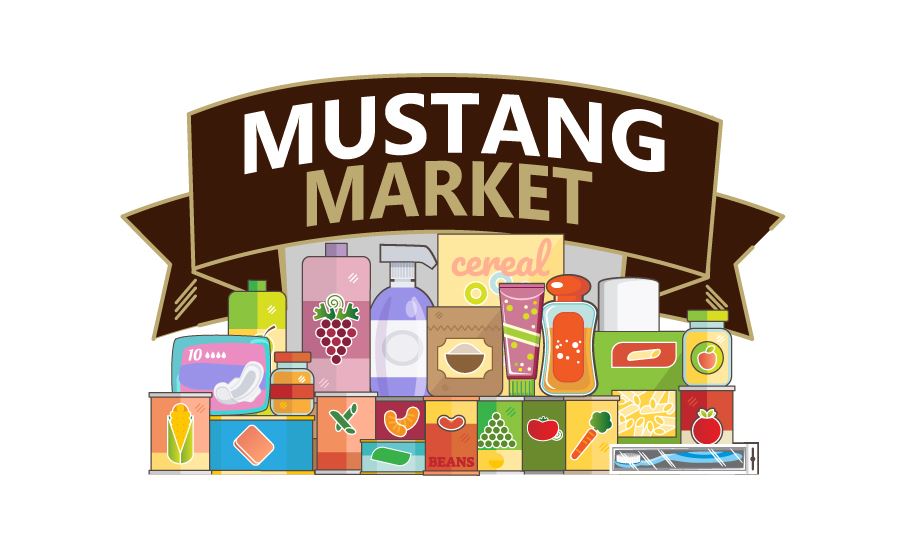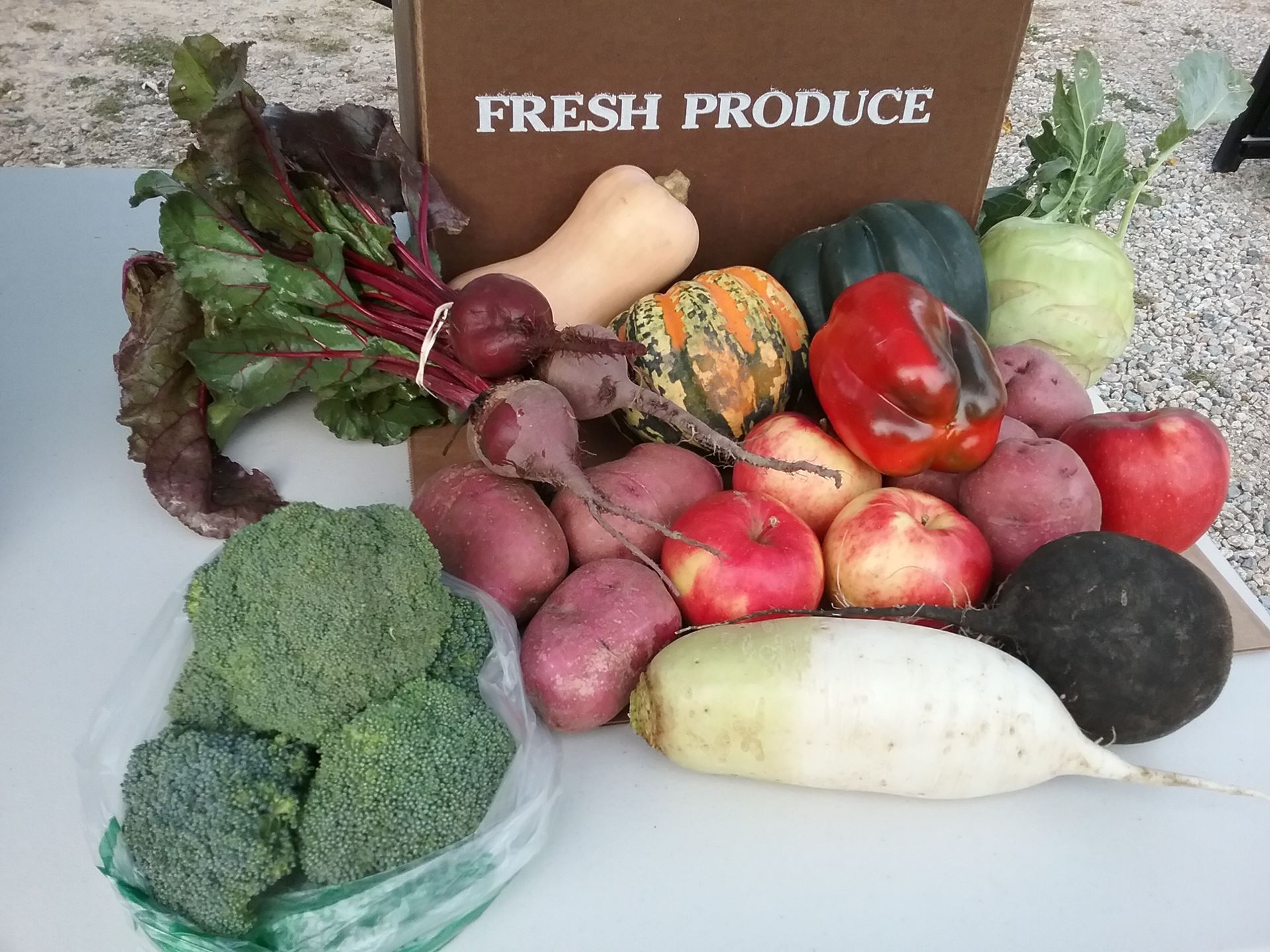 Multi-Year Drought Showing Adverse Effects on Minnesota’s Local Foodshed
Multi-Year Drought Showing Adverse Effects on Minnesota’s Local Foodshed
Customers visiting Minnesota’s early season farmers’ markets are getting concerned for their local produce farmers as produce is coming in late and slowly. “Back in April, we pushed the rollout of our Power of Produce for kids to July, because it was so wet. We’re glad we did, but now it’s for the opposite reason – it’s so dry and hot produce is coming in late,” said Lisa Krahn, chair of the Pine City Farmers’ Market. “We’re super excited we have over a dozen produce vendors this year, the early ones came to market with perennials like rhubarb and asparagus, some microgreens.” Pine City, located in Pine County, about an hour north of St. Paul on the Wisconsin border, is in ‘moderate to severe’ drought, according to the U.S. Drought Monitor for Minnesota.
Data released June 22, 2023 from the U.S Drought Monitor showed 92.32% of Minnesota is now in ‘abnormally dry to exceptional drought’ conditions, up 15% from last week. Areas in ‘moderate to exceptional’ drought more than doubled since last week to 39.43%.
For Christina Traeger, beef farmer in Stearns County, who sells meat at the Maple Grove Farmers’ Market and the Minneapolis Farmers’ Market, 2023 unfortunately is looking just as bad as 2021, when she had to haul her beef herd to Kansas to graze, once her pastures dried up. “Our pastures are already brown, and the grasses are dormant, so even if we get rain now, we’ll still only be able to rotate through pastures once, making us buy expensive hay much sooner and for longer than we want,” Traeger said. “We really rely on our direct marketing meat sales at farmers’ markets – it’s how we’re staying in business.” Stearns County is also primarily in a ‘moderate to severe’ drought.
Maple Grove Farmers’ Market Manager Mao Lee noted, "This week marks the debut of many of our produce farmers at the market, a delay of approximately 4-5 weeks from the anticipated timeline. Unfortunately, this growing season has been exceptionally challenging and has progressively worsened."
Crops hit the worst by the drought and heat are those on land without irrigation. "The challenge lies with small-scale farms such as the Hmong farmers, who cultivate two to three acres without land ownership. It's reassuring to see efforts being made to seek solutions, but how can we assist seasonal renters in improving their irrigation systems and providing support?" said Lee.
Farmer Sue Yang rents land in Coates, MN and battles drought conditions in his third challenging growing season, resorting to innovative methods. Pictured here, he constructed a deck on the back of his tractor to accommodate a water tank for irrigating his tomato fields. Determined to provide fresh produce at farmers' markets, Sue goes the extra mile, investing extra time, money, and effort to tend to his crops.
Produce farmer Erik Heimark of Aitkin, who also teaches farm business management through Central Lakes College, acknowledges it’s complicated. “Veggies, surprisingly, do very well in a drought- IF they are irrigated. That's why the majority of the U.S. supply is grown in Yuma Valley, Arizona and Salinas Valley, California. Almost everything I grow is on irrigation so I am set up to have a decent level of production. I will lose my sweet corn and dry beans this year to the drought; my garlic will be smaller; because that’s all not irrigated. And some of my lettuce is bolting.”
“Many of my students are asking for irrigation help from me now. It is definitely a necessary infrastructure for produce farmers with the changing climate. We need to push for more support for small veggie farmers to get support for digging wells, installing irrigation systems, etc.,” added Heimark.
Riverwalk Market Fair in Northfield pulls produce farmers from adjoining counties Dakota and Goodhue, both ‘abnormally dry.’ “We have three family farms at RMF who farm without access to water and irrigation - which means none of them have been able to make a market yet because their crops aren’t growing. It’s just heartbreaking,” noted Betsy Wentz, manager at RMF and a produce farmer by Cannon Falls.
Manager Sara George from the Red Wing Farmers’ Market in Goodhue County (abnormally dry) reports the market has a “slew of fruit and vegetable vendors lined up for the 2023 season and yet, only a couple have been able to attend the market thus far this year. The drought is AWFUL, there is little produce available unless you have excellent irrigation on your crops. The crops need rain so bad. Wabasha Farmers’ Market, a close neighboring market of ours has actually closed twice this season already due to lack of produce this season. We need rain.”
Wililyn Dowell, manager of the Grand Rapids Farmers’ Market Food Hub, and produce farmer in Itasca County said her area farmers are stressed out. “We have outdoor gardens and 2 high tunnels. Our strawberries had so many blooms in the spring, and they looked very promising, but the blossoms dropped. The fruits are very small. The garlic and onion leaves are yellowing and drying out. The spinach, lettuce, and radish that were planted in the outdoor gardens and in the high tunnel bolted right away. I had to pull them out. The drought has been very tough on our farmers,” said Dowell. Itasca County is abnormally dry according to the drought monitor.
The weather whiplash in Minnesota started with heavy snows during the winter, bringing hope that it would solve the lingering dry conditions from 2021 and 2022. Then February and March rains added runoff to frozen ground, followed by early hot temps, and now hot and dry.
“We’re at a record-high 375 farmers’ markets in Minnesota and our Tribal Nations, growing food and feeding their communities on a weekly basis, many going year-round,” said Kathy Zeman, executive director of the Minnesota Farmers’ Market Association (MFMA). “This multi-year weather pattern is so concerning because all that economic activity stays 100% local; and because it’s outside most state and federal ag data gathering efforts, the negative impact is rarely noted but profoundly felt.”
Possible Solutions
There are potential solutions for food farmers in Minnesota, albeit long term ones for future years.
Although not as well known, produce farmers and food farmers qualify for the same irrigation and soil health grants that commodity farmers have received for decades. Both the Natural Resources Conservation Services (NRCS) and Soil and Water Conservation Districts (SWCD) have programs available, but the intake forms do not lend themselves easily to diversified and specialized operations like produce farms. Some of these programs also limit grant funding to just one time, as opposed to multiple-year funding for commodity crops. Additionally, staff are often unfamiliar with non-commodity farms, making it a steep and at times frustrating learning curve for all involved.
Renewing the Countryside is a statewide organization whose mission is “working for a more just, vibrant, and sustainable rural America.” Aided by grants, they developed Conservation Connections, a program that has trained individuals throughout Minnesota, many who are bilingual, who are ready to help farmers new to government programs to access them and meet their local office personnel.
Crop insurance for this sector is not yet a viable option. MFMA partnered with 4 other groups on an Extension Risk Management Education grant to assess the effectiveness of the ‘new and improved’ Whole Farm / Micro Farm revenue-based insurance programs offered by the USDA. After gathering farm financials and providing insurance quotes to farm operators, project results clearly showed that both programs still need improvements to effectively help produce and smaller scale farmers to the same extent as other tax-supported programs assist commodity farmers “This is very new program targeting an audience that is simply not used to purchasing crop insurance,” said Ryan Pesch, Extension Educator, who collaborated with MFMA on the project. Pesch added, “Specialty crops and direct marketing can bring high value, but also high risk and it will take time and effort to bring this group into the practice of using insurance.”
“There were varied reasons why the farmers in our grant chose not to buy a policy,” Zeman said, “although one theme was that some are already mitigating risk through diversification.” In 2023, according to the Summary of Business reporter at the USDA Risk Management Agency, there were just 72 micro farm policies sold nationwide, with only seven in Minnesota.
“In the short term, the best solution for Minnesota’s food farmers to be able to weather this year’s drought is for their communities to buy local food regardless of cost or quality: directly from their farmers, and at their farmers’ markets,” added Zeman. “With every purchase from their communities, consumers are not just acquiring fresh, nutritious food; they are actively contributing to the preservation of sustainable farming practices, the reduction of food miles, and the strengthening of their community's resilience. Their willingness to pay a premium, if needed, demonstrates their understanding of the challenges faced by food farmers and their determination to ensure their continued success. By valuing the connection between farmer and consumer, this community is not only nourishing themselves but also cultivating a sustainable future for generations to come.”
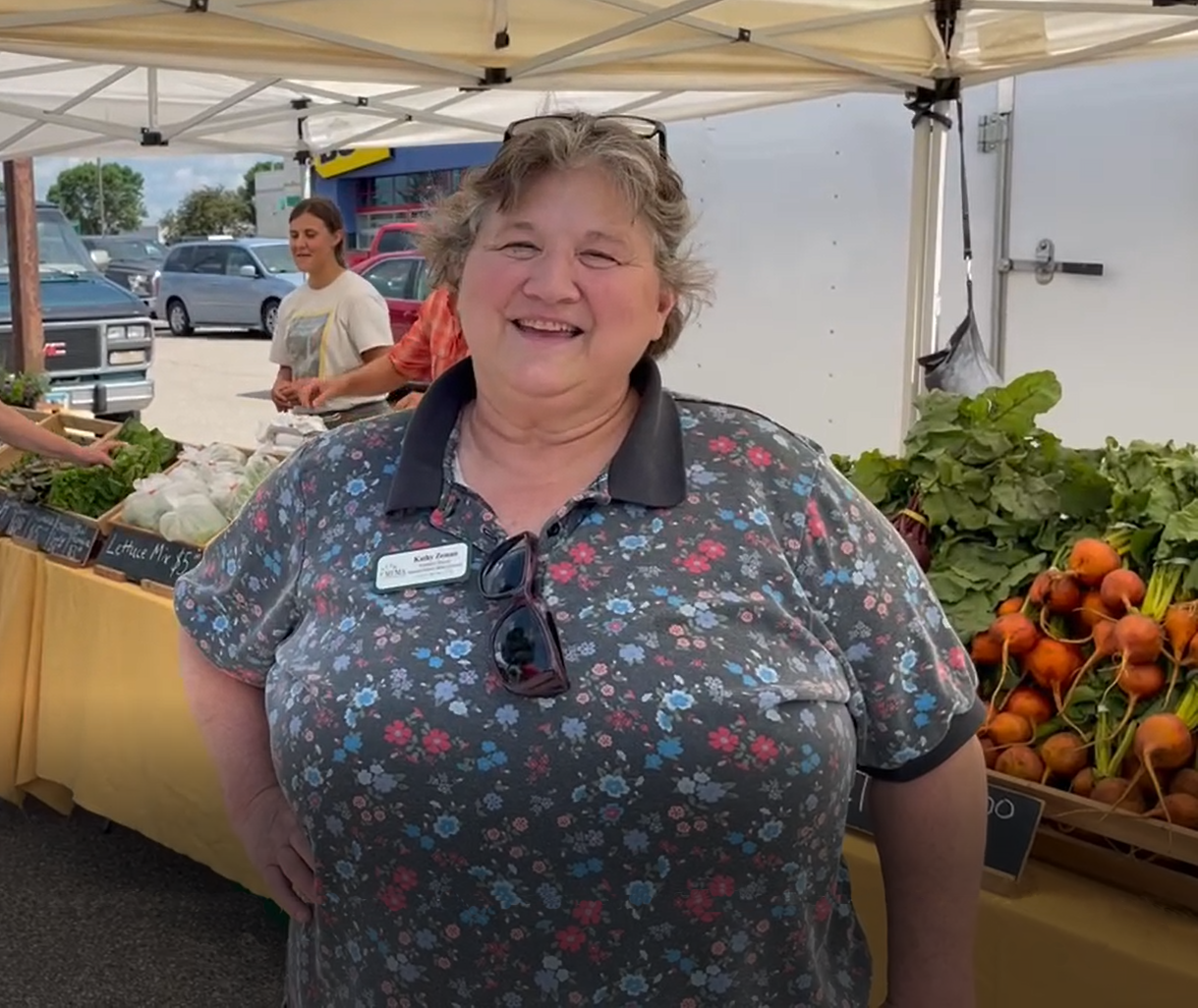 Kathy Zeman, MFMA Executive Director Kathy Zeman, MFMA Executive Director | Jane Jewett, MISA Associate Director |
MFMA Executive Director to Chair Minnesota’s Food Innovation Team November, 2022 - Minnesota Farmers’ Market Association (MFMA) announced today that MFMA Executive Director, Kathy Zeman, will serve as the chair of Minnesota’s Food Innovation Team (FIT) for 2022-2023. FIT was created in 2018as a subcommittee of the Minnesota Food Safety and Defense Task Force to help answer questions and assist food business owners in navigating Minnesota’s food licensing and regulatory environment. While many food business entrepreneurs and owners navigate through the licensing process with the Minnesota Department of Agriculture (MDA), the Minnesota Department of Health (MDH), or other delegated agencies with relative ease, the process can be complicated. There are occasions when challenges in licensing occur for a variety of reasons. When they do, FIT is there to answer questions, assist with complicated problems, and create paths for licensing needs. “We have thousands of very creative food entrepreneurs in Minnesota,” states Zeman. “FIT provides the ability for these entrepreneurs to get advice on how to resolve the complicated licensing process when they get stuck navigating food licensing laws in Minnesota. FIT provides a critical service for our rapidly growing food industry.” Zeman has served as the executive director of the Minnesota Farmers’ Market Association since 2012 where she has helped build strong collaborations with diverse groups and has paved the way for successful public policy efforts. She is also the owner of Simple Harvest Farm Organics in Nerstrand, Minnesota, and a trainer for the important Blazing Trails Through the Jungle of Food Regulations training program in Minnesota. She begins her duties as chair of FIT this month. Jane Jewett, associate director of the Minnesota Institute for Sustainable Agriculture (MISA), was the inaugural chair of FIT, having served for the past four years, and is credited in large part for its launch and success. “The case studies that we have reviewed in the past several years show the depth and variety of issues FIT faced,” says Jewett. “This committee is very important as we look to support and encourage food entrepreneurs to step into this space, make it through the process, and enhance our local foodshed. Food entrepreneurs who encounter licensing challenges sometimes give up, and we want to make sure systems are in place so there's support to find a way forward instead.” FIT meetings are held every other month and are open to everyone. Case studies on previously reviewed scenarios and additional information on Minnesota’s Food Innovation Team (FIT) can be found at: https://mn.foodprotectiontaskforce.com/food-innovation-team/. For more information on FIT, contact Kathy Zeman or Natasha Hedin, outreach coordinator, food and feed safety division within the MDA. About the Minnesota Farmers’ Market Association The Minnesota Farmers’ Market Association (MFMA) provides services, programs, and leadership that support and promote farmers’ markets across Minnesota. The organization works to foster a community of vibrant, profitable and professionally managed Minnesota farmers’ markets which cultivate, nourish and inspire a vibrant local foods landscape. The MFMA vision is to create greater accessibility to local, farm-fresh foods and to allow opportunities for local food producers to thrive and grow. For a listing of all farmers’ markets across Minnesota visit www.mfma.org |
Blazing Trails Local Food Regulations Training Series Critical for Food Farmers and Food Makers (CLICK HERE FOR SPANISH VERSION) Minnesota, October 13, 2022—In order to assist the rapidly growing local foods movement in Minnesota, six dates are set for important training in food regulation. “Blazing Trails Through the Jungle of Food Regulations” training is designed to provide access to information and resources on how to navigate food regulations pertaining to local food, to improve our food system. Information on important topics such as food safety, ‘product of the farm’ exclusion from licensing, the ‘cottage food law’ exemption from licensing, and the differences between MDA and MDH food licenses will all be covered. “The world of food regulations can be confusing,” says Kathy Zeman, Blazing Trails trainer, direct marketing farmer, and executive director of the Minnesota Farmers’ Market Association. “Blazing Trails provides clear explanations and reasoning for the rules and guidelines which govern our food system.’ “As a farmer, food entrepreneur, or local food advocate, understanding the legal aspects of our food system is really important,” says Jane Jewett, Blazing Trails trainer and associate director of the Minnesota Institute for Sustainable Agriculture. “Minnesotans in the sustainable ag and local food space are doing great work. We want to support and ensure their work is successful, without difficulties along the way,” The half-day training is scheduled for 6 separate offerings (same training, six separate dates). Registration is $10 and open to anyone with a passion for local farmers and local food who wants additional information on food regulations. Possible attendees include SHIP coordinators, Extension educators, farm group leaders, school board members, school food service directors, economic development staff, public health staff, farmers, restaurant owners, and farmers’ market operators. Anyone is welcome. Registration is now open at: www.mfma.org/Events Blazing Trails is sponsored by the Minnesota Institute for Sustainable Agriculture (MISA) and the Minnesota Farmers’ Market Association (MFMA). For more information, contact Kim Guenther, MFMA Communications Director at kguenther@mfma.org. About the Minnesota Farmers’ Market Association The Minnesota Farmers’ Market Association (MFMA) provides services, programs, and leadership that support and promote farmers’ markets across Minnesota. The organization works to foster a community of vibrant, profitable and professionally managed Minnesota farmers’ markets that cultivate, nourish and inspire a vibrant local foods landscape. The MFMA vision is to create greater accessibility to local, farm-fresh foods and to allow opportunities for local food producers to thrive and grow. About Minnesota Institute for Sustainable Agriculture The Minnesota Institute for Sustainable Agriculture (MISA) is a partnership between the University of Minnesota's College of Food, Agricultural and Natural Resource Sciences, University of Minnesota Extension, and the Sustainers' Coalition. The purpose of MISA is to bring together the diverse interests of the agricultural community with interests from across the University community in a cooperative effort to develop and promote sustainable agriculture in Minnesota and beyond.. |
|
|
|
Minnesota farmers’ market partners with local university to reduce food insecurity on campus. Minnesota, October 5, 2022 - The Marshall Farmers’ Market in Marshall, Minnesota is partnering with its local university, Southwest Minnesota State University (SMSU), to reduce food insecurity on campus. SMSU students who visit the Mustang Market, SMSU’s permanent food resource pantry, can receive $1 vouchers, which can be redeemed with participating vendors at the Marshall Farmers’ Market. “A larger portion of our students struggle with food insecurity than many people realize,” said Melissa Scholten, Director of Career Services and the Center for Civic & Community Engagement. “It can be very difficult to do well academically if basic needs like food and nutrition needs are not being met.” Back in 2017, Healthy56258 and SMSU began a workgroup consisting of campus and community leaders called the Nutrition Network. The workgroup was tasked with investigating ways to identify and address food insecurity among students. This work led to the hiring of an AmeriCorps VISTA to study the needs, and eventually the implementation of the Mustang Market. The Mustang Market, which was initially funded with internal SMSU grant funds, is now sustained by generous donations. The idea of partnering with the Marshall Farmers’ Market was originated by SMSU students who are regularly asked for feedback about the pantry. According to student feedback, the pantry is a great resource, but adding in an option for fresh fruits, vegetables, and other healthy staples would be a great next step. According to Marshall Farmers’ Market staff, the program was easy to implement since they have a strong EBT/SNAP food assistance program already in place at the Marshall Farmers’ Market, and the Mustang Market Bucks option will operate similarly. According to Marshall Market Coordinator Kim Guenther, this program is a win for everyone. “We’re very excited to initiate this partnership with SMSU,” said Guenther. “We get to support students in reducing food insecurity and in making healthy food choices, and support our local growers. The money spent by SMSU for this program will stay right here in our local community, which has economic value. And the Marshall Farmers’ Market is a hub for community connectivity, so we would love to see more SMSU students come check it out!” The Marshall Farmers’ Market, a member of the Minnesota Farmers’ Market Association (MFMA), is open on Saturday mornings from 7:30a.m. to Noon through the end of October, located at 200 S. A Street in Marshall. The Mustang Market on the SMSU campus is open once a month and by appointment for students and offered to supplement limited food budgets while in school. About the Minnesota Farmers’ Market Association The Minnesota Farmers’ Market Association (MFMA) provides services, programs, and leadership that support and promote farmers’ markets across Minnesota. The organization works to foster a community of vibrant, profitable and professionally managed Minnesota farmers’ markets which cultivate, nourish and inspire a vibrant local foods landscape. The MFMA vision is to create greater accessibility to local, farm-fresh foods and to allow opportunities for local food producers to thrive and grow. For a listing of all farmers’ markets across Minnesota visitwww.mfma.org |
Minnesota Farmers’ Market Association Announces Comprehensive Statewide Map of 346 farmers’ markets Minnesota, August 8, 2022— A new comprehensive map of farmers’ markets across Minnesota has been developed by the Minnesota Farmers’ Market Association (MFMA), plotting 346 markets across the state from Baudette to Mabel and Hendricks to Grand Marais. The official release of this map coincides with National Farmers’ Market Week (NFMW), August 7-13, 2022. NFMW is a week proclaimed by the USDA to celebrate farmers’ markets across the county. Governor Tim Walz has also declared this week Farmers’ Market Week in Minnesota, in conjunction with NFMW. The MFMA map is up and operating, and an impressive display of the number and significance of markets across Minnesota: https://www.mfma.org/farmers-markets/ “We have needed a comprehensive map of all markets in Minnesota for a very long time,” stated Kathy Zeman, MFMA Executive Director. “This map is phenomenal. For the first time, Minnesota residents across the state can find a complete listing of all the state’s markets in one location.” According to MFMA staff this project took time and tenacity. “We did it the old-fashioned way,” says MFMA’s Economic Opportunity VISTA Maeve Mallozzi-Kelly who led the project. “I picked up the phone and called nearly every city office or chamber of commerce across the state, and documented every market I could find. We are continuing to add and update information to this map daily, so it will continue to get better and more robust.” The map is powered by the software platform Marketspread, an online management company which offers a variety of tools for farmers’ markets, and event management. The map includes information on location, dates and times of operation, programs offered at the markets. A listing on this map is offered to all Minnesota farmers’ markets free-of-charge as a service by MFMA. For people wanting to visit a farmers’ market in Minnesota while on vacation, visiting family, or traveling for work, finding one is now a lot easier. “Farmers’ markets promote community, provide a low-barrier entry point for small and mid-sized farmers, and play a vital role in our local foodshed,” adds Zeman. “We want to support farmers and makers, build community, and showcase Minnesota. Farmers’ markets do all of that and more.” MFMA is requesting that market operators across Minnesota check the map to verify their market is listed, and have a market representative officially claim their market to ensure the most accurate information possible. To add or update map information, contact Maeve Mallozzi-Kelly at maeve@mfma.org or 574-310-5553. August 4, 2022 Celebrations marking National Farmers’ Market Week (Aug. 7-13, 2022) in Minnesota will culminate with a public event on Saturday, August 13 at Minneapolis Farmers’ Market. There will be shopping and activities for guests throughout the morning, with presentations from dignitaries including Minnesota Agriculture Commissioner Thom Petersen, beginning at 10 a.m. “Farmers’ markets create a relationship between the people who grow local, nutritious food and customers who want a connection with where their food comes from,” Petersen said. “We believe farmers’ markets are for everybody and I’m thrilled to celebrate the role farmers’ markets play in Minnesota communities.” During the event, there will be a Chopped-style cooking competition with local chefs using fresh market ingredients to create the best dish, as well as fun for the whole family. This event is being presented in partnership by the Minnesota Farmers’ Market Association (MFMA), Minnesota Grown, Minnesota Farmers Union (MFU), and Minneapolis Farmers’ Market. "National Farmers' Market Week is a great time to celebrate and say thank you to all of the amazing people who make farmers' markets work, from the farmers, food entrepreneurs, crafters, and market organizers to all of the loyal customers who come out and support them,” said Kathy Zeman, MFMA executive director. “Farmers' markets are all about community. They are about building relationships between farmers and customers, building a robust local foodshed, meeting friends and new acquaintances, and giving everyone access to healthy, locally grown food." According to statistics by the United States Department of Agriculture (USDA), farmers’ markets and farm stands account for roughly $2 billion of the $3 billion that Americans spend annually on farm-direct products. This revenue supports the livelihoods of more than 165,000 mostly small and mid-sized farmers. Agriculture is the foundation of Minnesota's economy, and Minnesota currently has roughly 350 farmers’ markets located in all corners of the state. “Farmers’ markets are important because they provide a place for farmers to sell products directly to consumers and those earnings are more likely to be reinvested locally and stay in the community longer,” said MFU President Gary Wertish. “Farmers who direct market are more likely to have a stable income, which allows them to stay in business. And, when food comes direct from the farm it is fresher and more nutritious.” National Farmers’ Market Week is a yearly celebration sponsored by the USDA which highlights the value markets bring to communities and the important role they play in the U.S. food system. Each year, farmers’ markets across Minnesota participate in the event by creating their own independent celebrations. “We as farmers are proud to serve our community here in the Twin Cities by providing access to food that nourishes the body, the mind, and the soul,” said Bonnie Dehn, Minneapolis Farmers Market Board President. “We’re happy to provide the community a place to ask questions about farming, learn who the farmers are, and experience the diversity of our farmers’ market.” List of Activities:
About Minneapolis Farmers’ Market: The Minneapolis and Nicollet Mall Farmers Market was established in 1876 in Downtown Minneapolis. Our mission is simple, to connect local farmers and gardeners with Twin Cities residents to build a sense of community over a shared love of food. As the largest farmer-managed markets in the state, we serve as a community resource, meeting place, a tourist draw, and, most importantly, a place to access Minnesota’s greatest selection of fresh produce, plants, and locally made products. About the Minnesota Farmers’ Market Association: The Minnesota Farmers’ Market Association (MFMA) provides services, programs, and leadership that support and promote farmers’ markets across Minnesota. The organization works to foster a community of vibrant, profitable, and professionally managed Minnesota farmers’ markets that cultivate, nourish, and inspire a vibrant local foods landscape. The MFMA vision is to create greater accessibility to local, farm-fresh foods and to allow opportunities for local food producers to thrive and grow. Find their statewide map of markets at www.mfma.org. About Minnesota Grown: Minnesota Grown is a program of the Minnesota Department of Agriculture to promote products grown and raised in Minnesota. The program has connected consumers with local farmers, farmers’ markets, and other producers of agricultural products near them for over 35 years. The Minnesota Grown Directory at minnesotagrown.com is a searchable map of over 1,000 local farms, markets, and producers all across the state. The program also licenses the use of the Minnesota Grown label to Minnesota producers and retailers. Anywhere you see the Minnesota Grown logo, you can have confidence that product was grown or raised within the state. Find local near you in our directory of over 1,000 farms and markets at minnesotagrown.com. About Minnesota Farmers Union: Minnesota Farmers Union works to protect and enhance the economic interests and quality of life of family farmers and ranchers and rural communities. MFU is a nonprofit membership-based organization. Membership is open to everyone. Learn more and join at www.mfu.org, and follow MFU on Facebook, Twitter, and Instagram. ### Media Contact
An evening of beer and celebration for farmers’ markets, growers, and makers Minnesota, July, 2022 The Minnesota Farmers’ Market Association (MFMA) and Lakes & Legends Brewing Company are partnering for an evening of beer, food, and celebration of Minnesota farmers' markets. This event is a part of the Lakes & Legends Beer for Better Events which support a variety of important local organizations and causes. The event will take place on Thursday, July 28th from 3p.m. to 10p.m. at the Lakes & Legends Tap Room at 1368 Lasalle Ave in Minneapolis. Lakes & Legends will donate $1 for every pint sold to the Minnesota Farmers’ Market Association. “Farmers’ markets play a vital role in Minnesota- connecting farmers to consumers and supporting small and mid-sized growers. They are critical to our state’s economy, local foodshed, and community.” said Kathy Zeman, Executive Director of MFMA. “We are thrilled to be selected to partner with Lakes & Legends for this event to support farmers’ markets and to celebrate the importance and vitality of the nearly 350 farmers’ markets across Minnesota.” Lakes & Legends is the first Minnesota Grown brewery partner in the state, utilizing locally grown ingredients from farms in Minnesota. In addition to their regular selection of locally brewed beer with local ingredients, Lakes & Legends will be brewing a special Minnesota farmers’ market beer for the event! Although we have not yet officially announced the name or details of the beer, we can tell you it will be infused with fruit from the St. Paul Farmers Market. (No more hints, just come out and try it!) Come hungry, as the evening will have Mexican cuisine available for purchase from the Full Belly Happy Heart food truck. A variety of vendors from various farmers' markets in the Twin Cities and surrounding areas will also be at the event, showcasing their organizations and businesses from 5-8p.m. Select vendors include:
About the Minnesota Farmers’ Market Association The Minnesota Farmers’ Market Association (MFMA) provides services, programs, and leadership that support and promote farmers’ markets across Minnesota. The organization works to foster a community of vibrant, profitable and professionally managed Minnesota farmers’ markets which cultivate, nourish and inspire a vibrant local foods landscape. The MFMA vision is to create greater accessibility to local, farm-fresh foods and to allow opportunities for local food producers to thrive and grow. For a listing of all farmers’ markets across Minnesota visit www.mfma.org About Lakes & Legends Brewing Company Lakes & Legends Brewing Company is a brewery and taproom located at 1368 Lasalle Ave. They focus on quality ingredients, partnering with local farmers for their award winning beer. That same quality is extended to the taproom, where a warm and welcoming space invites community (dog and family friendly!). They are always experimenting and innovating, working on new beers to surprise and excite! www.lakesandlegends.com Questions about this event can be directed to MFMA Communications Director Kim Guenther 573-470-4445.   June, 2022 Drought Relief Webinars set for June 14 and 22nd Minnesota, June 9, 2022 - Two webinars are set for mid-June to help farmers get ready to apply for drought relief for expenses due to last summer's drought. Preparing to Apply for Drought Relief Tues. June 14, 12 pm to 12:30 pm How to Apply for Drought Relief Weds. June 22, 12 pm to 1:15 pm Register: https://z.umn.edu/ApplyDroughtRelief The webinars will focus on specialty crops, but much of the information is the same for livestock producers and they are welcome to attend. The Minnesota Legislature passed drought relief in the 2022 session. An application period will open June 21 and be open for approximately 10 business days. Get ready now to apply as soon as the application is available! The June 14 webinar will cover preparations farmers should make right away in order to be ready to apply as soon as the application period opens. This half-hour webinar will cover the kinds of expenses the drought relief will cover, the kinds of records farmers should assemble and save, and show how to fill out a W-9 form as a sole proprietor. The June 22 webinar will cover the details of how farmers can apply for drought relief. This 1-hour webinar plus question-and-answer time will walk through an example of the whole application process. Hmong, Spanish, Somali, and Swahili interpretation will be provided. Other languages may be available and language requests will be considered. Please contact Jane Jewett at jewet006@umn.edu to ask about other languages. Language requests must be received by the Friday before each webinar (by June 10 for the June 14 webinar, and by June 17 for the June 22 webinar.) Stakeholders from the agricultural and local food community are collaborating to offer this webinar to help prepare farmers to apply for drought relief: Big River Farms, Land Stewardship Project, MN Farmers’ Market Association, MN Farmers Union, MN Institute for Sustainable Agriculture, MN SARE, Renewing the Countryside, Sustainable Farming Association of Minnesota, The Good Acre, and the Minnesota Department of Agriculture. For more information contact: Jane Jewett, Minnesota Institute for Sustainable Agriculture, jewet006@umn.edu or Kathy Zeman, Minnesota Farmers' Market Association, kzeman@mfma.org |
February, 2022 More Farmers’ Market Food Hubs Dotting Minnesota’s Local Food Landscape in 2022 Minnesota, February 2022 - A new business opportunity awaits select Minnesota farmers’ markets in 2022 due to a grant that Renewing the Countryside (RTC) was recently awarded by the USDA Local Food Promotion Program (LFPP). Through this grant, 10 farmers’ markets will receive both financial and technical assistance to become licensed farmers’ market food hubs. The farmers’ markets will bring together product from multiple farmers and offer it to larger-scale buyers like grocery stores, restaurants, and institutions supporting food access programs. Farmers’ market growers who don’t have the time, resources, or enough product to sell directly to such buyers, can now work with their market and sell collectively as a food hub in addition to selling directly to farmers’ market customers. Joining RTC in administering the grant are the Minnesota Farmers’ Market Association (MFMA) and the Minnesota Institute for Sustainable Agriculture (MISA). Key partners in this endeavor are the Minnesota Department of Agriculture (MDA); and the Minnesota Department of Health (MDH) Statewide Health Improvement Program (SHIP) coordinators who will provide outreach support in the communities where the market hubs are located. “This LFPP grant builds on the work we’ve done the past five years, piloting this concept of farmers’ markets as food hubs,” said Sara George, RTC project coordinator. “With our earlier grants, we were able to trial online sales platforms that are critical to a hub's success, test processes for efficiency, and iron out licensing details. This $750K LFPP grant now provides support for three years, 2022-2024, to 10 market hubs, with the end goal to have them fully serving their communities with local food year-round.” Farmers Annelie and Kevin Livingston-Anderson of Good Turn Farm in Stockholm, WI, have been a part of the Wabasha Farmers’ Market food hub since its inception. “We’ve been really happy with how it has increased our access to new retail and wholesale customers without increasing our marketing labor,” said Annelie. “It also gave us a low risk way to become familiar with using an online sales platform which we have since adopted for our own farm.” “This is about supporting rural economic development,” said Kathy Zeman, MFMA executive director. “We need to provide more opportunities to get locally grown food into the hands of our communities and provide opportunities for more food partnership for our local farmers. This project does both.” Laurie and Mark Timm of Fairview Farm in Winona County began selling products through the Wabasha Farmers’ Market online program in 2021. “We realized that COVID was not going away and there were many customers who wanted to be able to source healthy foods locally and safely,” said Laurie. “This program helped us through a challenging year and allowed us to reach new customers including schools, restaurants, and individuals who wanted and needed nutritious foods at their tables. What a great program for the farmer and consumer!” New market hubs will receive financial support to buy the required startup supplies and equipment, an online sales platform, promotions, training for vendors and buyers, as well as anannual stipend for the hub manager. All participating market hubs will receive specialized financial training from the University of Wisconsin’s Food Finance Institute. Market hubs, with assistance from SHIP, will find buyers to purchase weekly produce from the market hubs, providing communities with fresh, local produce. For more information on this farmers’ market food hub project, visit: https://farmersmarkethub.org, contact RTC’s Sara George at sara@rtcinfo.org, MFMA’s Kathy Zeman at kzeman@mfma.org, or MISA’s Jane Jewett at jewet006@umn.edu. About Renewing the Countryside Renewing the Countryside is a non-profit organization whose mission is to provide inspiration, ideas and assistance to individuals and communities who are looking for sustainable ways to strengthen their rural communities and reduce poverty. They work to foster the development of sustainable rural communities and landscapes that balance environmental, social, and economic needs. They also work to educate the larger public of the value of these sustainable rural endeavors to society and the planet and to engage their help in “renewing the countryside.” About the Minnesota Farmers’ Market Association The Minnesota Farmers’ Market Association (MFMA) provides services, programs, and leadership that support and promote farmers’ markets across Minnesota. The organization works to foster a community of vibrant, profitable and professionally managed Minnesota farmers’ markets that cultivate, nourish and inspire a vibrant local foods landscape. The MFMA vision is to create greater accessibility to local, farm-fresh foods and to allow opportunities for local food producers to thrive and grow. About Minnesota Institute for Sustainable Agriculture The Minnesota Institute for Sustainable Agriculture (MISA)is a partnership between the University of Minnesota's College of Food, Agricultural and Natural Resource Sciences, University of Minnesota Extension, and the Sustainers' Coalition. The purpose of The Minnesota Institute for Sustainable Agriculture (MISA) is to bring together the diverse interests of the agricultural community with interests from across the University community in a cooperative effort to develop and promote sustainable agriculture in Minnesota and beyond. |
|
|
October, 2021
Drought-Stricken Farmers Call for Short-Term Relief & Long-Term Solutions
Listening Session Highlights Summer’s Heavy Toll on Small & Medium-Sized Vegetable, Fruit & Livestock Producers
The 2021 drought has had a devastating impact on Stearns County farmer Liz Dwyer: her well went dry, vegetable plantings shriveled, livestock had to be butchered early because of lack of hay and the Community Supported Agriculture (CSA) program at her Dancing the Land Farm had to stop deliveries eight weeks early. Yet, when she called her local USDA Farm Service Agency office to find out about drought assistance, Dwyer was told she didn’t qualify because her diversified operation didn’t fit the mold of farms the agency was used to working with.
“The reality is I feed hundreds of people, and yet there’s no support in a year like this, and this is the kind of year that just kills small farms,” she said during a recent drought listening session held by the Land Stewardship Project and the Minnesota Farmers’ Market Association.
Other small and medium-sized farmers who raise vegetables, fruit and livestock shared similar stories during the virtual listening session, which was attended by Minnesota Commissioner of Agriculture Thom Petersen, as well as several state legislators. In many parts of the region, the drought started in the spring and extended throughout the summer. By last month, more than three-quarters of Minnesota was considered to be in “severe” or “extreme” drought, according to the U.S. Drought Monitor. Nearly 60 percent of the state’s pastureland is in “very poor” or “poor” condition, according to Petersen.
Listening session participants made it clear that for many farmers, this is an emergency situation requiring immediate assistance. On Sept. 24, Governor Tim Walz announced that he is proposing a $10 million drought assistance package that he would like to be considered at a special session of the Legislature next month. That proposal includes $5 million in grants of up to $5,000 for livestock watering systems and irrigation equipment while also offering $5 million for a zero-interest loan program.
Land Stewardship Project organizer Sarah Goldman said that as a drought relief package is considered in coming weeks, the public needs to push for long-term resiliency planning funding to proactively address extreme weather in future growing seasons.
“Over the past few years, we have seen unprecedented droughts and flooding across the state, and these events have pushed farmers to the brink," she said. "It is time to support farmers in integrating practices that will mitigate some of the most harmful effects of these extreme weather events and ensure those currently on the land can stay farming with adequate relief resources.”
Listening session participants also made it clear that the state needs to address long-term climate change issues if agriculture is to remain viable in the state. University of Minnesota Extension fruit production educator Annie Klodd said her office is dealing with unprecedented climate-related issues such as the need for more irrigation in areas that historically have not required it.
“Climate change is here,” said David Manuel, a farm manager for the Red Lake Nation in northwestern Minnesota. “We need state-mandated climate mitigation action.”
KaZoua Berry, program manager for Big River Farms in Washington County, said policymakers need to take steps to help farmers deal with climate change in the long term by adjusting programs to support small-scale farmers while cutting red tape and providing incentives for consumers to support these farmers at places like farmers’ markets.
“This is the kind of conversation we should have had a decade ago,” she said.
"When lawmakers are considering drought assistance, an emphasis should be placed on small to medium-sized producers who have the kind of operations often left out of mainstream farm program support," said Kathy Zeman, executive director of the Minnesota Farmers’ Market Association.
“It’s critical that this relief package is accessible to smaller-scale, diversified farms, those who are renting land, those who are selling good food directly to our communities and ensuring they have the support needed to navigate applying for this aid,” said Zeman.
---------------------------------------------------------------------------
The Land Stewardship Project’s mission is to foster an ethic of stewardship for farmland, to promote sustainable agriculture and to develop healthy communities for everyone.
The Minnesota Farmers’ Market Association provides services, programs and leadership that support and promote farmers' markets across Minnesota.
For more information contact:
Sarah Goldman, LSP, sgoldman@landstewardshipproject.org, 612-400-6341
Laura Schreiber, LSP, lschreiber@landstewardshipproject.org, 612-207-4693
Kathy Zeman, MFMA, kzeman@mfma.org, 507-664-9446
